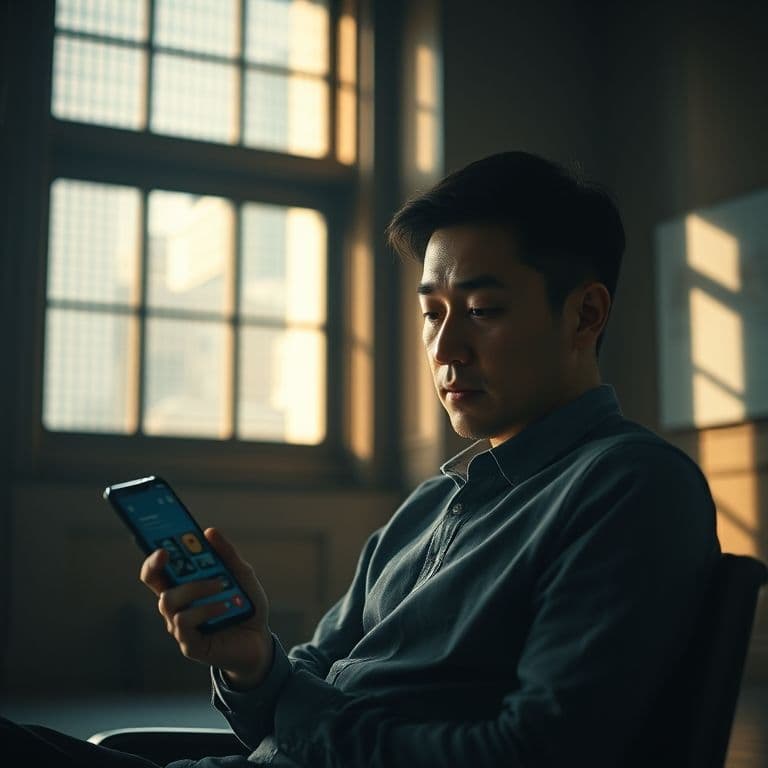Breaking the Silence: A New Approach to Men's Mental Health Support

In a world where 'man up' has been the default response to male emotional struggles, millions of men are suffering in silence. The recent viral TikTok video asking 'who do you call when you're at your lowest' reveals a heartbreaking truth: many men feel they have nobody to turn to. This isn't just about loneliness—it's about a systemic failure in how we support men's mental health. But what if technology could provide the safe space that traditional support systems have failed to create?
The Silent Crisis: Understanding Men's Mental Health Isolation
The comments on the viral TikTok video paint a disturbing picture of modern male loneliness. Men from all walks of life are expressing feelings of complete isolation, with many stating they wouldn't call anyone during their lowest moments. This isn't just about having friends or family—it's about the deep-seated fear of burdening others, the stigma of showing vulnerability, and the very real concern that opening up might be used against them later. The pattern is clear: societal expectations have created a environment where men feel pressured to handle emotional struggles alone, leading to what many commenters described as an 'epidemic of loneliness and sadness.'
What makes this crisis particularly insidious is that it often occurs invisibly. As one commenter noted, 'a man can be surrounded by 100 of his friends and family, yet still feel so alone.' This isn't just about physical isolation—it's about emotional isolation in plain sight. The fear of judgment, the concern about being perceived as weak, and the lack of safe spaces for emotional expression create a perfect storm of silent suffering that affects millions of men worldwide.

A Revolutionary SaaS Solution: Anonymous Mental Health Support
Imagine a mental health platform designed specifically to address the unique barriers men face when seeking support. This hypothetical SaaS solution would provide completely anonymous chat support, allowing men to express their struggles without fear of judgment or social consequences. The platform could feature trained peer supporters who understand male-specific mental health challenges, creating a bridge between informal support and professional help.
The core innovation would be its layered approach to support. Users could start with completely anonymous text-based chats, then gradually move to voice-only options if they become more comfortable, and eventually access professional counseling services—all within the same platform. This gradual escalation model respects the user's comfort level while providing multiple pathways to get the help they need. The platform could use AI to match users with supporters who have similar experiences or backgrounds, creating immediate rapport and understanding.
Community forums would serve as digital gathering spaces where men can share experiences, strategies, and support without the pressure of one-on-one interaction. These forums could be organized by specific challenges (grief, relationship issues, career stress) or by interests and backgrounds, creating micro-communities of understanding and support. The entire platform would be built on principles of complete confidentiality, zero judgment, and understanding of male socialization patterns that often make traditional therapy approaches less effective for men.

Potential Benefits and Impact Scenarios
The hypothetical platform could transform how men approach mental health support. For the man who lost both parents and feels alone in crowded rooms, this could provide immediate peer support from others who've experienced similar loss. For the person who fears burdening their limited family, anonymous professional counseling could offer relief without guilt. For those who've had negative experiences opening up to people who later used it against them, the platform's anonymity would eliminate this risk entirely.
The economic impact could be significant too. By addressing mental health issues earlier and more effectively, such a platform could reduce workplace absenteeism, improve productivity, and decrease healthcare costs associated with untreated mental health conditions. The social impact might be even greater—helping break generational patterns of emotional suppression and creating healthier models of masculinity that benefit not just men, but their families and communities.
Conclusion
The viral TikTok video and its heartbreaking comments reveal a critical gap in our mental health support systems. While traditional approaches have failed many men, technology offers new possibilities for creating safe, accessible, and effective support mechanisms. This hypothetical SaaS solution represents more than just another app—it could be a lifeline for millions of men who currently suffer in silence. The technology exists, the need is undeniable, and the potential impact is enormous. The question isn't whether such a platform could work, but whether we have the collective will to make it happen.
Frequently Asked Questions
- How would this platform ensure user anonymity and privacy?
- The hypothetical platform would use advanced encryption, no personal data storage, and completely anonymous user identifiers. All chats would be encrypted end-to-end, and no personally identifiable information would be required to access basic support services.
- What makes this approach different from existing mental health apps?
- Unlike general mental health apps, this concept would be specifically designed around male socialization patterns and the unique barriers men face in seeking help. The gradual anonymity options, male-specific content, and community-focused approach would address issues that generic platforms often miss.
- How could such a platform be monetized sustainably?
- Potential revenue models could include employer wellness programs, premium features for advanced support, partnerships with mental health professionals, and corporate social responsibility sponsorships. The free tier would ensure accessibility while premium features could fund ongoing development and support.


